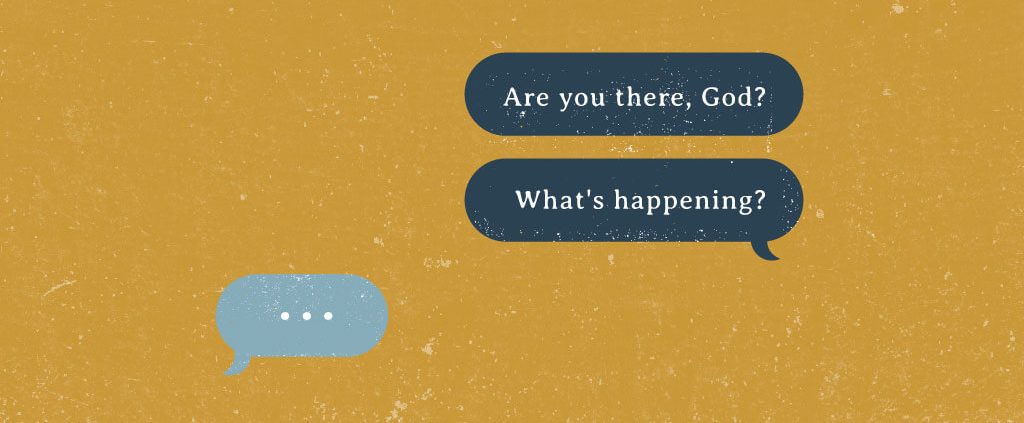When God Isn’t Who You Thought He Was
Some years ago, my family went through quite an upheaval as we transitioned from one country to another.
The transition unearthed in me something unsettling about my own understanding of who God is.
Why is God pulling me away from a vibrant ministry, from a place I felt so alive? Did the “desires of (my) heart” really matter (Psalm 37:4)? Why, when I thought He and I had been partners in this good work, was it so discardable? And then, when circumstances within my family spiralled after our move—why did my obedience seem to result in disaster?
I thought, “Would a God who loves and cares for me do things like this?”But as I sorted through my emotions, I noticed there were a lot of people in the Bible who had to deal with God being different from who they thought He was. There was Jonah, who was plenty angry with God, and so was King Saul. Even the “model citizens”—Job. David. Elijah, burned out and cowering in a cave. John the Baptist, slouched in the corner of a fetid cell, sent word to Jesus, “Are you the one who is to come, or shall we look for another?”.
I’m reminded of Erwin McManus’s paraphrased response of Jesus to John’s desperate question: “The blind see, the lame walk, the dead are being raised, but you, John, you are going to die” (Luke 7:18-23).
My sister, in a post she wrote on this passage, says so poignantly: “For some, the Messiah looks like healing, cleansing, hearing, hope; and for others, it looks like prison. It looks like a life in the wilderness that ends in a beheading.”
“But ‘blessed is the one who is not offended’ (v. 23)”.
Yes, Jesus seems to be saying, the gospel means tremendous freedom. But it also has a bloodied cross within—a death to self, a total trusting of everything we are to God, even when it doesn’t seem “good” by our standards.
Sometimes God leads us not into what feels good, or into clear “blessing,” but into the death of our selves.
Blessed and favoured but yet, pierced
Consider the life of Mary, the mother of Jesus. Mary was called “favoured” (Luke 1:28, 30; literally “graced” in the Greek) and “blessed” (vv. 42, 48), called to give birth to “the Son of the Most High”.
But then, we read on to see the “consequences” of this favour: faced with a near-divorce (Matthew 1:18-19). Having to flee from infanticide (Matthew 2:13-14). The precious Son doomed to die of the sickest form of capital punishment, but not before she and the rest of His family assumed He was insane (Mark 3:21).
“Blessed” and “pierced” are frighteningly, frequently hand in hand for those God loves. That’s not to say God sees the “piercing” as good in itself. There’s a reason Jesus cries angrily at the tomb of Lazarus, despite a miracle around the corner.
God says things “will work together for the good of those who love Him” (Romans 8:28). With two thousand years’ of hindsight, the purpose behind John’s suffering, or Mary’s, or Jesus’, is more apparent to us.
Still, it doesn’t save me from wrestling with the drawn-out suffering of my friend’s mum, who eventually succumbed to cancer at fifty-something. I’m still unsettled by the death of a man due to a car accident I was in. I’m still bewildered by the gap of profound suffering between the impoverished world and the developed one.
And because God doesn’t see our pain as good, in and of itself, it makes me wonder if He’s weeping, too.
Trusting in the Wise One
It’s unrealistic to think we can resolve this in just one article. I have written before about that grey Saturday of waiting for a resurrection. About lamenting what is truly a travesty in this broken world. About preaching to myself rather than just listening—that, come Heaven, there will be no more mourning or crying or pain, when God at last proves Himself. When at last everyone can see there are no victims of His justice system.
I know that my anger now is like a broken bathroom scale: It’s wrongly calibrated. James says my anger doesn’t bring about God’s righteousness (James 1:20). I am faulty in my judgments. And I know that beneath my anger is some profound hurt. Disappointment. Confusion. Unbelief. Shuddering fear.
I just want to lean on my own three-pound brain understanding of the world. But there is too much evidence that this God is who He says. And there are too many parts of me starkly false, undeveloped, limited in sight: “Let God be true and every man a liar” (Romans 3:4). He’s the plumb line of what’s true. Not my disappointment, confusion, unbelief, or fear.
Consider, for example, the new puppy my family just brought home. When I take him to the vet or set up an electric fence, it’s done out of my love for my dog—and because my brain is a lot bigger than his. The experience and understanding I have gained of what lies beyond the fence for cute, feisty little dogs is so vast, he could never comprehend it. In fact, to him, it might look like I don’t love him.
But my assessment of what’s good and what’s dangerous is a lot broader, wiser, and more developed than his.
As I grapple with these difficult questions that I can’t find answers for, I hear Job’s words:
I know that you can do all things, and that no purpose of yours can be thwarted. You asked, “Who is this that hides counsel without knowledge?” Therefore, I have uttered what I did not understand, things too wonderful for me, which I did not know… (Job 42:2-3).
It’s strange, but I find that those same reasons I can’t wrap my mind around God—the reasons that He is not me-sized—are the exact reasons He’s worthy of my worship.
Twice, someone pointed out to me the introductory verse of Isaiah 6: “In the year that King Uzziah died I saw the Lord sitting upon a throne, high and lifted up”. As one pastor paraphrased it for us: “When everyone was freaking out, I saw the glory of the Eternal God and King.”
Right now, what I have is this truth, even though my heart struggles to understand it: That holy, holy, holy (separate, high above, yet still God-with-us) Father is purer and truer than anything I could create or comprehend.
As author Evelyn Underhill writes, “If God were small enough to be understood, He wouldn’t be big enough to be worshipped.” And that’s even when I must lament, like the Psalmist, a lack of what I thought His character would look like.
Along with the Psalmist, we cry, “How long, O Lord?”
“I wait for the Lord, my whole being waits, and in His word I put my hope” (Psalm 130:5).
I wish I could say, “That was then, this is now!” But some of my question marks about God still haven’t straightened into exclamation points. Yet what also hasn’t changed, amidst my emotional and circumstantial tides, is that Jesus Christ is the same yesterday, today, and forever (Hebrews 13:8).
Who He is remains.
This article was originally published on the writer’s blog here. This version has been edited by YMI.













Leave a Reply
Want to join the discussion?Feel free to contribute!